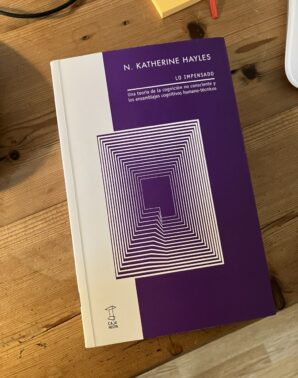Unthought. Non-Conscious Cognition for Thinking Human-Technical Synergies

On 3 December we present the talk Unthought. Non-Conscious Cognition for Thinking Human-Technical Synergies with Katherine Hayles, Alejandra López Gabrielidis and Toni Navarro in Hangar’s Sala Ricson. In it, Hayles will talk with the translators of her latest book in Spanish, Unthought, published by Caja Negra, one of Hangar’s orbiting collectives. Key concepts of her work will be explored, such as non-conscious cognition, distributed cognition and human-technical cognitive assemblages. Katherine Hayles is one of the most relevant authors in posthumanist studies in recent decades. Her reflections map the evolution of the human-machine nexus through a transdisciplinary approach based on the intersections between philosophy, neuroscience and technology.
Furthermore, in this conversation with the author, we propose to expand the standard notion of artificial intelligence, broadening the relationship between consciousness and cognitive process, multiplying the repertoire of desirable articulations with technical objects and other forms of biological life. The idea is to address the implications that Hayles’s thought advances by proposing a planetary cognitive ecology that critically interpellates other currents, such as new materialisms or object-oriented ontology. Hayles’s theoretical corpus rethinks the coordinates of the contemporary humanities and stands as a privileged site for opening up new ways of deciphering the complex socio-technical transformations that shape the present.
Katherine Hayles is the Distinguished Research Professor at the University of California, Los Angeles, and the James B. Duke Professor Emerita from Duke University. Her research focuses on the relations of literature, science and technology in the 20th and 21 st centuries. Her twelve print books include Postprint: Books and Becoming Computational (Columbia, 2021), Unthought: The Power of the Cognitive Nonconscious (Univ. of Chicago Press, 2017) and How We Think: Digital Media and Contemporary Technogenesis (Univ. of Chicago Press 2015), in addition to over 100 peer-reviewed articles. Her books have won several prizes, including The Rene Wellek Award for the Best Book in Literary Theory for How We Became Posthuman: Virtual Bodies in Literature, Cybernetics and Informatics, and the Suzanne Langer Award for Writing Machines. She has been recognized by many fellowships and awards, including two NEH Fellowships, a Guggenheim, a Rockefellar Residential Fellowship at Bellagio, and two University of California Presidential Research Fellowships. She is a member of the American Academy of Arts and Sciences. Her latest book came out in December 2023 from the University of Chicago Press, Bacteria to AI: Human Futures with our Nonhuman Symbionts.
Alejandra López Gabrielidis is a philosopher and researcher specialising in art and digital technologies. Her research focuses on the new modalities of corporeality that emerge in relation to the phenomenon of datification, exploring the interaction between data and the body from an approach of distributed agentiality and cognition. She is currently coordinator of the Doctoral Programme and lecturer in Aesthetics and Theory of Art in the Design and Fine Arts programmes at BAU, University Centre of Arts and Design in Barcelona. She has worked as a post-doctoral researcher in the Technopolitics Unit of the CNSC (Communication Networks and Social Change) group at the Interdisciplinary Internet Institute (IN3) of the Universitat Oberta de Catalunya (UOC), and as coordinator of the Vector de Conceptualización Sociotécnica. In addition to her academic work, she has translated works by authors such as Franco ‘Bifo’ Berardi and Katherine Hayles, and has published numerous articles and essays in various magazines and specialised media.
Toni Navarro is a philosopher specialising in feminist and Marxist theories of technology, with a particular interest in the political economy and cognitive ecology of AI. He is part of the vector of socio-technical conceptualisation promoted by the Technopolitics Unit of the Interdisciplinary Internet Institute (IN3/UOC). He occasionally publishes in media such as El Salto Diario and has given courses and lectures at various universities and art centres. His texts have appeared in anthologies such as ¿Un futuro automatizado? Perspectivas críticas y tecnodiversidades (UNSAM, 2023) and Léxico critico del futuro (UNSAM, 2024), and he has recently translated and edited books such as Lo impensado: una teoría de la cognición no consciente and los ensamblajes cognitivos humano-técnicos by N. Katherine Hayles. Katherine Hayles (Caja Negra, 2024, with Malinche Traducciones) or Matemáticas revolucionarias: inteligencia artificial, estadística y la lógica del capitalismo by Justin Joque (Verso Libros, 2024).
Practical information
Day: Tuesday, 3 December
Time: 18:30 h
Venue: Sala Ricson, Hangar
Free entrance
This activity is deployed within the public activity segments of the Shared Library.
![]()
Categories: Agenda Hangar | Tags: bibliotecacompartida
